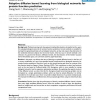Free Online Productivity Tools
i2Speak
i2Symbol
i2OCR
iTex2Img
iWeb2Print
iWeb2Shot
i2Type
iPdf2Split
iPdf2Merge
i2Bopomofo
i2Arabic
i2Style
i2Image
i2PDF
iLatex2Rtf
Sci2ools
144
click to vote
BMCBI
2008
2008
Adaptive diffusion kernel learning from biological networks for protein function prediction
Background: Machine-learning tools have gained considerable attention during the last few years for analyzing biological networks for protein function prediction. Kernel methods are suitable for from graph-based data such as biological networks, as they only require the abstraction of the similarities between objects into the kernel matrix. One key issue in kernel methods is the selection of a good kernel function. Diffusion kernels, the discretization of the familiar Gaussian kernel of Euclidean space, are commonly used for graph-based data. Results: In this paper, we address the issue of learning an optimal diffusion kernel, in the form of a convex combination of a set of pre-specified kernels constructed from biological networks, for protein function prediction. Most prior work on this kernel learning task focus on variants of the loss function based on Support Vector Machines (SVM). Their extensions to other loss functions such as the one based on Kullback-Leibler (KL) divergence,...
Related Content
| Added | 08 Dec 2010 |
| Updated | 08 Dec 2010 |
| Type | Journal |
| Year | 2008 |
| Where | BMCBI |
| Authors | Liang Sun, Shuiwang Ji, Jieping Ye |
Comments (0)

